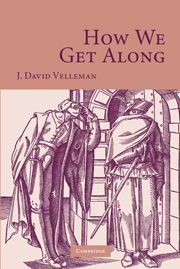7 - Meaning
Published online by Cambridge University Press: 05 July 2015
Summary
I have claimed that a rational agent resembles an improvisational actor in that he tries to make sense in causal-psychological terms, by acting in ways that can be understood as caused by his motives, habits, and other characteristics. But a theatrical improviser tries to be intelligible in an additional sense. For he tries to further the arc of the drama by doing things that will make for a good story, and they will make for a good story if they can be comprehended, or “grasped together,” in the shape of a narrative. Does a rational agent resemble a theatrical actor in this respect as well, by aiming to make sense in narrative terms?
I assume that narrative intelligibility requires psychological intelligibility but not vice versa. That is, a story requires action, and action has to be intelligible as caused by the attitudes and attributes of a character, lest it count as no more than mere behavior, like blushing, sneezing, and fainting, which do not make for a story. Some theorists of narrative, following Aristotle, believe that causal intelligibility is all that's required for a story. If they are right, then making causal-psychological sense would already amount to making narrative sense as well. And in that case, the rational agent would already share the theatrical actor's concern for storytelling, simply by being concerned for making sense in causal-psychological terms. But I think that the Aristotelian theorists are mistaken: causal explanation and storytelling convey fundamentally different modes of understanding.
- Type
- Chapter
- Information
- How We Get Along , pp. 185 - 206Publisher: Cambridge University PressPrint publication year: 2009



